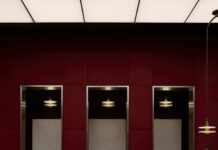[ad_1]
I often say that subtlety can be lost on me. But that’s not entirely true. While I more easily embrace and understand directness, I know subtle, almost imperceptible variations can make me feel or react in other ways. Whether it’s a slight change in temperature while sleeping, a different shade of gray paint in a room, or a “new and improved” brand of toilet paper, I can usually detect the understated contrasts.
There are so many distinctive aspects of lighting . . . brightness, color, energy efficiency, etc. . . . yet there’s one that may be the most elusive – direct vs. indirect. It can get glommed in with ambient vs. task or even up-lighting vs. downlighting, but it is its own consideration. How the light is delivered to an area can make a subtle yet profound difference—one you might not even notice in the grandest spaces like warehouses, stadiums, convention centers, large retail facilities, and the like.

Direct lighting seems, well, obvious and direct. You aim a light source at an object or space, and when that light source is turned on the object or space is illuminated. Indeed, there is some indirect effect since the light may also brighten objects and areas in the surrounding area, but the bulk of the light is aimed in one spot. It’s pretty straightforward. In high-bay settings like those mentioned earlier, a bright, comfortable, yet evenly distributed light is the goal. Particularly, in spaces where safety and concentration are in demand, the type of light should be a vital consideration.

Indirect lighting is achieved by reflecting the light from a source. It can be reflected from a ceiling or from fixtures with built-in polycarbonate reflectors. The smooth and soft illumination from indirect light sources reduces eye strain and fatigue and does not cast a harsh shadow or create pools of darkness and light, resulting in a more comfortable environment for workers and sports fans alike.
It’s easy to see why indirect lighting is often confused with up-lighting since shining a light upward and bouncing it off the ceiling is often how indirect lighting is accomplished. Depending on the effect you’re coveting, there are fixtures galore and countless installation techniques that can help you reap the positive effects of indirect lighting in any direction. You can even reflect downward light from a counter or a floor by nestling strip or rope lights beneath a cabinet or a toe kick. And don’t forget to consider the benefits of combining direct and indirect light to maximize productivity and well-being.
1000Bulbs’ team of knowledgeable and friendly lighting experts is always available to help with any of your lighting questions. It’s easy to speak with them directly (not indirectly!). Call 1-800-624-4488 today.
[ad_2]
blog.1000bulbs.com










